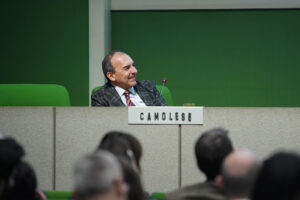Hello Mr. Camolese. Please tell us with whom do we have the pleasure?
 I’m Marco Camolese, 55 years old and I have a degree in Electronic Engineering.
I’m Marco Camolese, 55 years old and I have a degree in Electronic Engineering.
Since 2000, I’ve been working as a certified Italian and European patent, design and trademark attorney. Considering also my previous job as a patent licensing manager, I currently have more than 25 years of experience in the IP field.
I’m the Head of Metroconsult’s Turin office and the primary focus of my daily work is patent protection. Moreover, I often represent my clients as a technical consultant in front of the Courts whenever a case related to patent law is being dealt with.
What is your favorite part of working as a patent attorney?
Before answering your question, I want to highlight that various skills must be developed and refined to successfully practice this profession.
Firstly, being a good interviewer is primordial. When you are discussing with the inventors you must be able to abstract a great deal of details. The inventor sometimes has a narrow vision on his invention; it’s therefore important to ask the correct questions that can broaden his idea and let you get a deeper understanding of the innovation he made. Accordingly, you must develop good listening skills and pay attention to every detail.
Being proficient in English is also very important in order to write patent applications (please note that most of the Italian patent applications are translated or are directly written in English) and, in particular, in order to deal with EPO examiners during the examination phase.
Finally, having a solid legal competence is another fundamental skill when you are faced with counterfeiting products.
Having that said that, my favorite part of being a patent attorney is certainly dealing with the EPO during the oral proceedings. It always makes me feel as if I’m taking a university exam. There are three examiners in front of you that are strongly passionate and ask you unexpected questions, so you must be well-prepared and have solid arguments to discuss with them. It’s really challenging.
Why companies, and in particular start-ups, need to protect their intangible assets and how can this be achieved?
I believe that one of the major reasons why startups need to ensure protection through patents, trademarks and other IP rights is that their whole business model is basically based on intangible assets. In other words, without their intangible assets, many businesses would not be able to exist or make profit. Consequently, companies must take every step necessary to protect them and ensure that they are not subject to counterfeiting or any other similar threats.
A company can easily better protect its intangible assets by:
- Having a basic understanding of IP rights and how they operate
- Relying on an IP attorney who could be internal but also external to the company
- Doing IP and market research to know whether another party already possesses a similar patent or any related intangible asset. This aims not only to prevent unintentional counterfeiting, but also to avoid duplicating the R&D effort
- And as already mentioned, monitoring that the company’s IP rights are not subject to counterfeit or any similar action
 What is your advice on preventing infringement and how do you support your client when a patent has been infringed?
What is your advice on preventing infringement and how do you support your client when a patent has been infringed?
Having a good lawyer with solid technical competencies is the first important step in an infringement case. In Italy, a patent attorney has no right to plead before Court; he can only support the lawyer as a technical consultant. However, the biggest issue is the inability of some general attorneys-at-law to comprehend the complexity of a specific invention. During litigation this can be a big problem. Sometimes explaining the invention to someone with no technical background is very difficult because it is not always easy to simplify the matter in such a way that it becomes understandable for everyone.
Litigations are very expensive and lengthy with a 50/50 success rate. So, it is also important to make your client aware that arbitration or mediation could be a valid alternative to Court litigation.
What was the most interesting patent application you had so far?
Let me say that I find all inventions are interesting. I often deal with electronic patents and therefore I am delighted to look at non-electric patent applications from time to time.
However, my favorite case has nothing to do with electronic, mechanics or such but it was related to a recipe; a special way of cooking peppers by adding bread to them. It was really an out-of-ordinary request but, surprisingly, I was capable of filing a patent application which the EPO decided to examine.
What should one pay attention to if they want to become a patent attorney?
Keeping an eye on details is very important since the success rate of any granted patent application depends on the level of detailed information presented in the patent application.
Perseverance is another important factor, because there is a lot of work to do in oder to apply for a patent.
What are the most common mistakes you see businesses make when it comes to patents?
The biggest mistake is not doing any prior research to check if the same or similar inventions already exist. SMEs usually have a limited budget to assign to R&D and patenting activity. Therefore, if the invention already exists, this can result in a huge loss of money for the company which could have been better allocated.
Thank you very much for your time today and all the valuable insights into Patent protection.
This interview is done by Emil Abseher, Helena Ehrlich, Lise Emanuelle Geahchan, Elsa Laziamond, and Jakob Roeckl – Bachelor students at the ESCP Business School – as part of their Collective Project.


 What is your advice on preventing infringement and how do you support your client when a patent has been infringed?
What is your advice on preventing infringement and how do you support your client when a patent has been infringed?